





 |
 |
 |
 |
 |
 |
| Damon Lynch | profile | all galleries >> Galleries >> Rabbi Fruman's daughter's wedding | tree view | thumbnails | slideshow |
|
Few problems of national scope in Israel and Palestine are as emotional as that of Israeli settlements inside the West Bank. Weddings tend to be emotional also. So when I was offered the opportunity by Jewish peacemaker Eliyahu McLean to attend a Jewish settler wedding deep inside the West Bank it was an easy invitation to accept. Up till this point, settlers were people I had occasionally met at bus stops or at the Western Wall. Apart from settlements on the outskirts of Jerusalem such as Gilo, I had never been into their communities or shared a meal with them. Of all settlements one could visit, one of the most interesting would have to be where the wedding was being held that night, Tekoa. Few settlements have a religious leader of the calibre of Rabbi Menachem Fruman (also spelled Froman), a deeply spiritual man who tends to shatter many more stereotypes of a settler rabbi than he confirms. 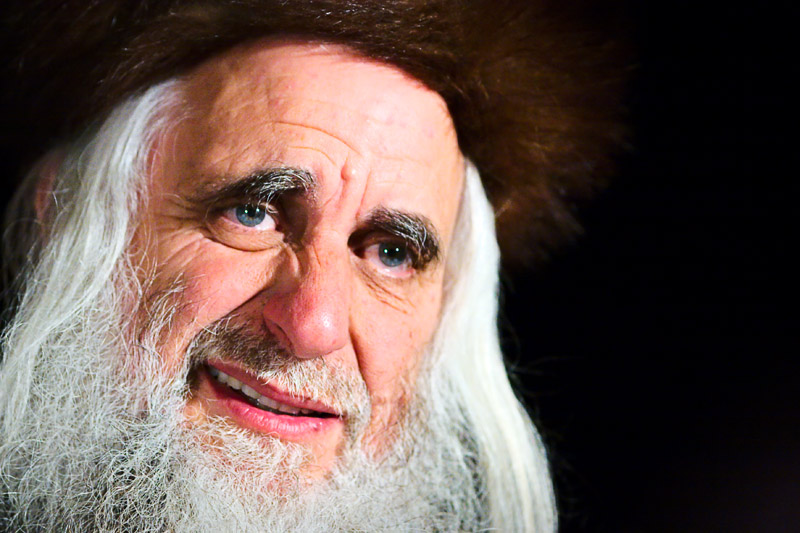
Stereotypes are the perceptions we have of people other than our own when we do not know them well. Whether based on partial truths or simple falsehoods they never convey the whole reality of another people. When we meet such people in a spirit of tolerance, our stereotypes are often replaced with a greater understanding of who they are and who we are. When we meet someone vastly different to us and our old understanding of them changes so much that it is reversed, a curious and wonderful transformation occurs: a stereotype becomes a type-stereo. Those of you who are old enough to have grown up listening to music in mono format will know what a difference it makes when the same music is played in stereo format. The music gains depth, direction, and most importantly, life. Likewise, when a stereotype becomes a type-stereo our understanding of the world becomes that much richer and real. We begin to know who they are, who we are, and despite our differences what we share in common. Fruman is a type-stereo Rabbi if ever there has been one. Settlers have a well-deserved reputation for having truly large families. Fruman himself has around ten children. Yet he is also a man who was told by Yasser Arafat “You are my brother!” He is a man who has met with leaders of Hamas and made agreements with them. He is a man who starts a letter to the President of Palestine “In the Name of Allah the Merciful”. Newspapers have reported him saying “When I hitchhike, a bunch of Arabs stop, get out of their cars, and shake my hand and say 'The sage Rabbi Fruman, we know you and we agree with your views.'” 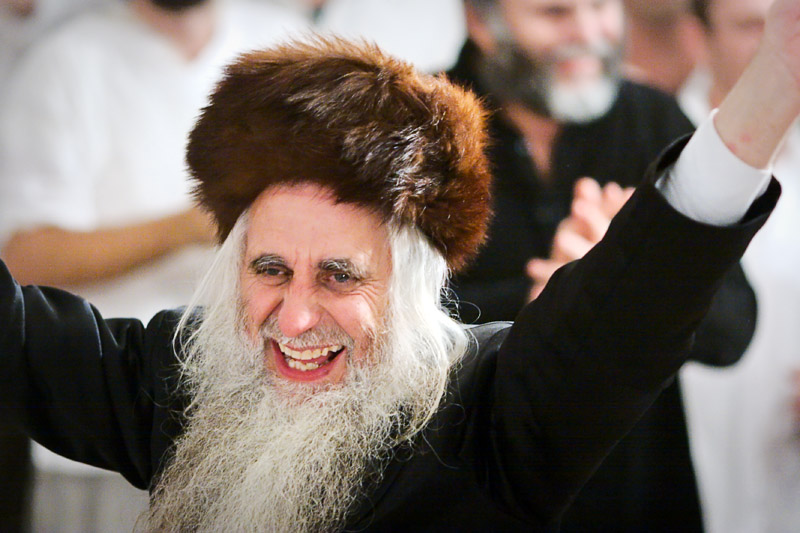
Fruman has clearly spent a long time reflecting on peace in Israel Palestine. Papers also report him saying “The negotiators forget that there are two primitive nations warring here. Most people [are] primitives; I'm a proud primitive. We need to build a primitive, prophetic peace. A liberal peace won't work here.” He asks “Wouldn't it be a boon to the spirit of Israel to purify the love of the land from control over it?” He proposes that settlers in the West Bank live within a Palestinian state. The majority of both Palestinians and Israelis see settlers as the mechanism through which Israel unilaterally annexes an ever increasing amount of Palestinian land, making a viable Palestinian state an impossibility. Consequently in addition to practically all Palestinians, a notable number of Israelis are against the settlers—including an emerging movement of Israeli soldiers who refuse to serve in the West Bank. But Fruman can envision a day where the entire settlement movement matures and changes its objectives, becoming “the fingers of the hand outstretched to peace, that part of the hand that really touches the other side”. 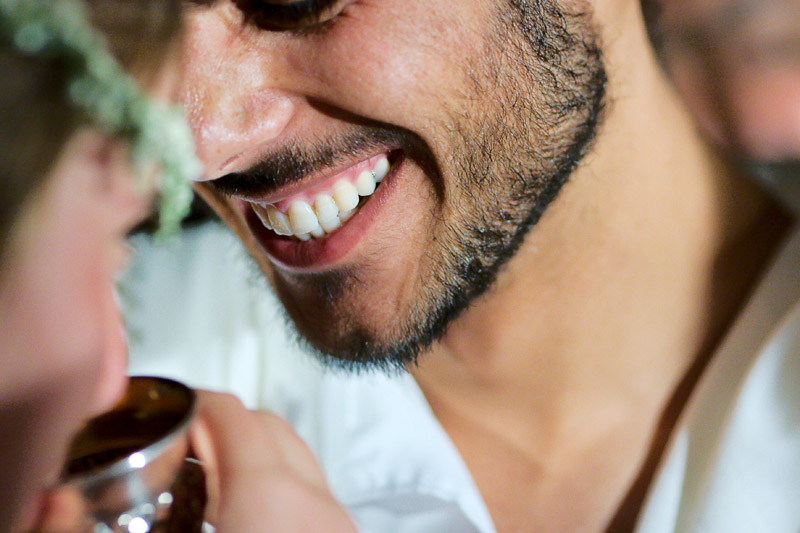
It was one of Fruman's daughters who was being married. Earlier in the year he had brought her and her groom to a Sufi Sheik to be blessed. But this night the seven blessings, or sheva brachos, were from Jews in a traditional ceremony. This took place when couple, family members and distinguished others were gathered under and around the traditional outdoor chuppah (canopy). 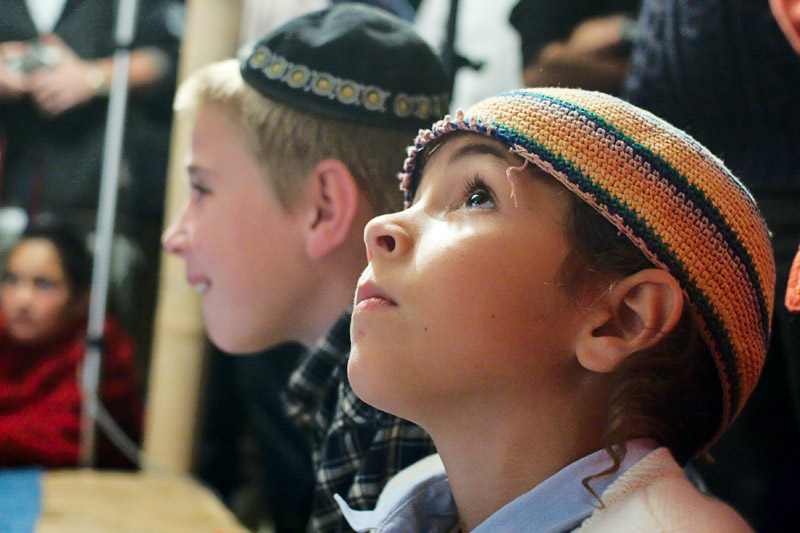
The rest of the attendees encircled it closely, their faces conveying a mix of joy and expectation. Fruman talked a little of his grandfather, a senior religious figure in Poland who was murdered during the holocaust. A traditional cup of wine was shared among the beaming couple. 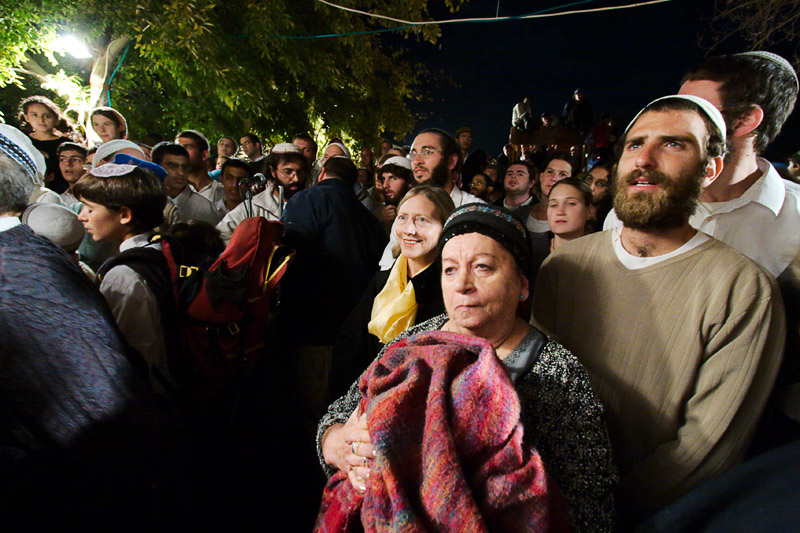
The food was served and families began to eat. The more pious among the attendees began to pray in the synagogue. This was the point where the newly married couple went off to a private room, the cheder yichud. In days gone by this occasion signified a marriage's consummation, but these days a couple tends to use it to spend time together. After the meal the dancing began. 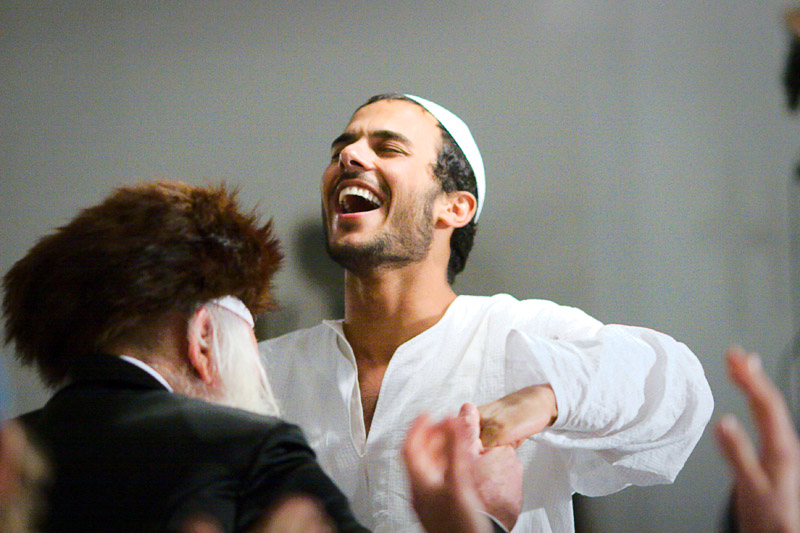
The men and women danced separated by a partition. But this did not stop the women from sneaking a look onto the men's side to see what was going on. 
For much of the time the new husband and wife danced on separate sides, at the center of a swirling mass of bodies going around and around for hours, full of energy and joy. Then the couple came to dance together, on the woman's side and then on the men's side. People were having a truly wonderful time together. 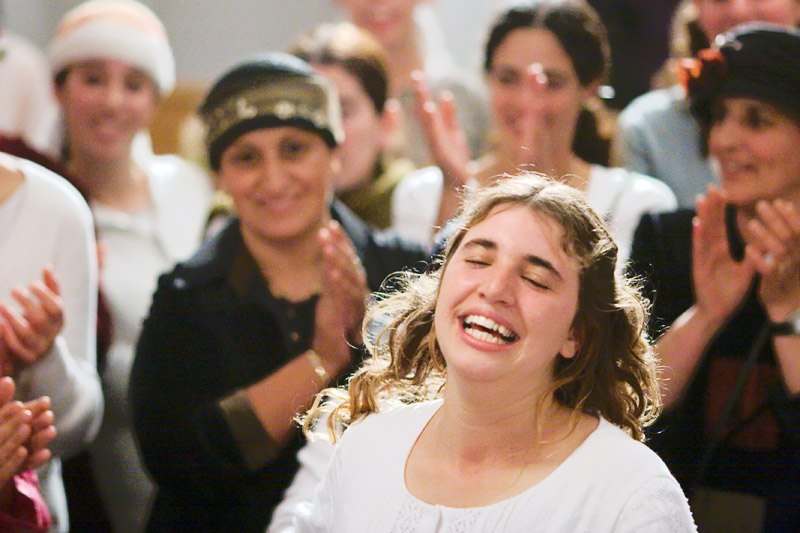
Yet here we were, deep inside the West Bank, and not a Palestinian was to be seen. That changed when Ibrahim Ahmad Abu El-Hawa appeared in his traditional Palestinian white dress, complete with kaffiyeh (headdress). A soldier guarding the wedding with an automatic weapon was speechless when he saw Ibrahim enter. Ibrahim asked him “how are you”, but his shock at seeing an Arab was so great he could not even open his mouth. He simply stared and stared, unable to comprehend what he was seeing. Other guests too were shocked by the presence of Ibrahim. But not Fruman. The delight that had been in his eyes all evening surged when he saw his old friend. 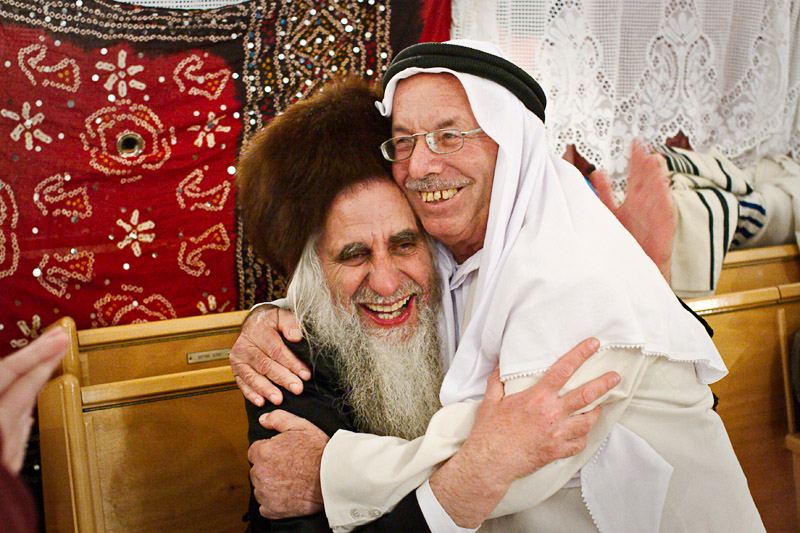
The two warriors for peace danced together, and for the first time since the dancing began the center of attention was not the newly married couple but Fruman and Ibrahim. It was tremendously moving to see a Jew and a Palestinian sharing a dance, having fun and making the point that peace is possible. 
Fruman—who describes himself as a fundamentalist—recently said “To me, 'rule' (shilton) is a masculine value and 'land' (eretz) is a feminine value. And so, for many years, I've felt the most positive movement being made by the Jewish spirit—together with the human spirit—is the movement from masculine values to feminine values.” If only more so-called fundamentalists shared his views. He added “Therefore the movement from the value of 'conquering the land' to the value of 'love of the land' is the movement we must make for the sake of promoting the spirit of the Jewish faith. . . . What interests me in this possibility is the option to use it to connect rootedness with freedom, east with west, love with liberty, left with right—and to make other spiritual connections” (Haaretz Magazine, July 22 2005). |
| comment | share |
| Guest | 30-Jan-2011 08:48 | |
| Guest | 22-Sep-2009 13:12 | |
| Jerry Gerber | 14-Nov-2007 22:55 | |
| jawad | 05-Jun-2007 13:49 | |
| Loukas | 15-May-2007 22:16 | |
| Sterghios | 15-May-2007 21:18 | |
| Kaparu2 | 23-Dec-2006 20:34 | |
| Mayer | 07-Nov-2006 18:53 | |
| jerrymia | 18-Sep-2006 08:04 | |
| Guest | 16-Sep-2006 20:31 | |
| Eric Herbelin | 16-Sep-2006 18:19 | |
| Nicholas Baumgartner | 15-Sep-2006 14:40 | |
| John Amato | 15-Sep-2006 02:15 | |
| rafa castellano | 14-Sep-2006 21:15 | |
| Marisa Livet | 14-Sep-2006 19:47 | |
| Dan Chusid | 14-Sep-2006 17:09 | |
| Donald Verger | 13-Sep-2006 08:55 | |
| Richard Calmes | 11-Sep-2006 17:15 | |
| Linda Hendry | 11-Sep-2006 06:21 | |
| JOSE MATA | 10-Sep-2006 11:31 | |
| Matylda Lempel-Chareza Photography | 09-Sep-2006 17:57 | |
| nomada | 09-Sep-2006 09:59 | |
| Guest | 07-Sep-2006 22:20 | |
| Kaparu2 | 01-Sep-2006 16:02 | |
| guest | 02-Jul-2006 19:35 | |
| Guest | 05-May-2006 08:48 | |
| Digital Rebel | 25-Mar-2006 13:15 | |
| Tom | 23-Mar-2006 17:12 | |
| raymondg | 23-Mar-2006 12:21 | |
| Mike | 16-Mar-2006 13:47 | |
| Meir | 24-Jan-2006 17:15 | |